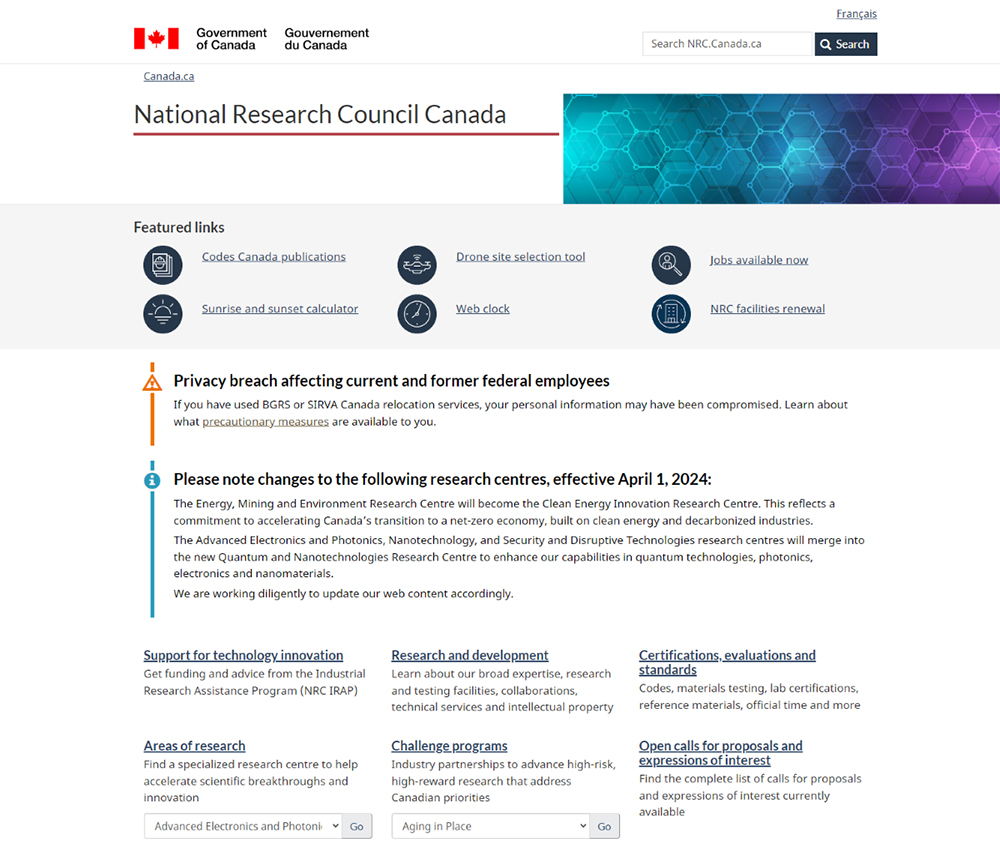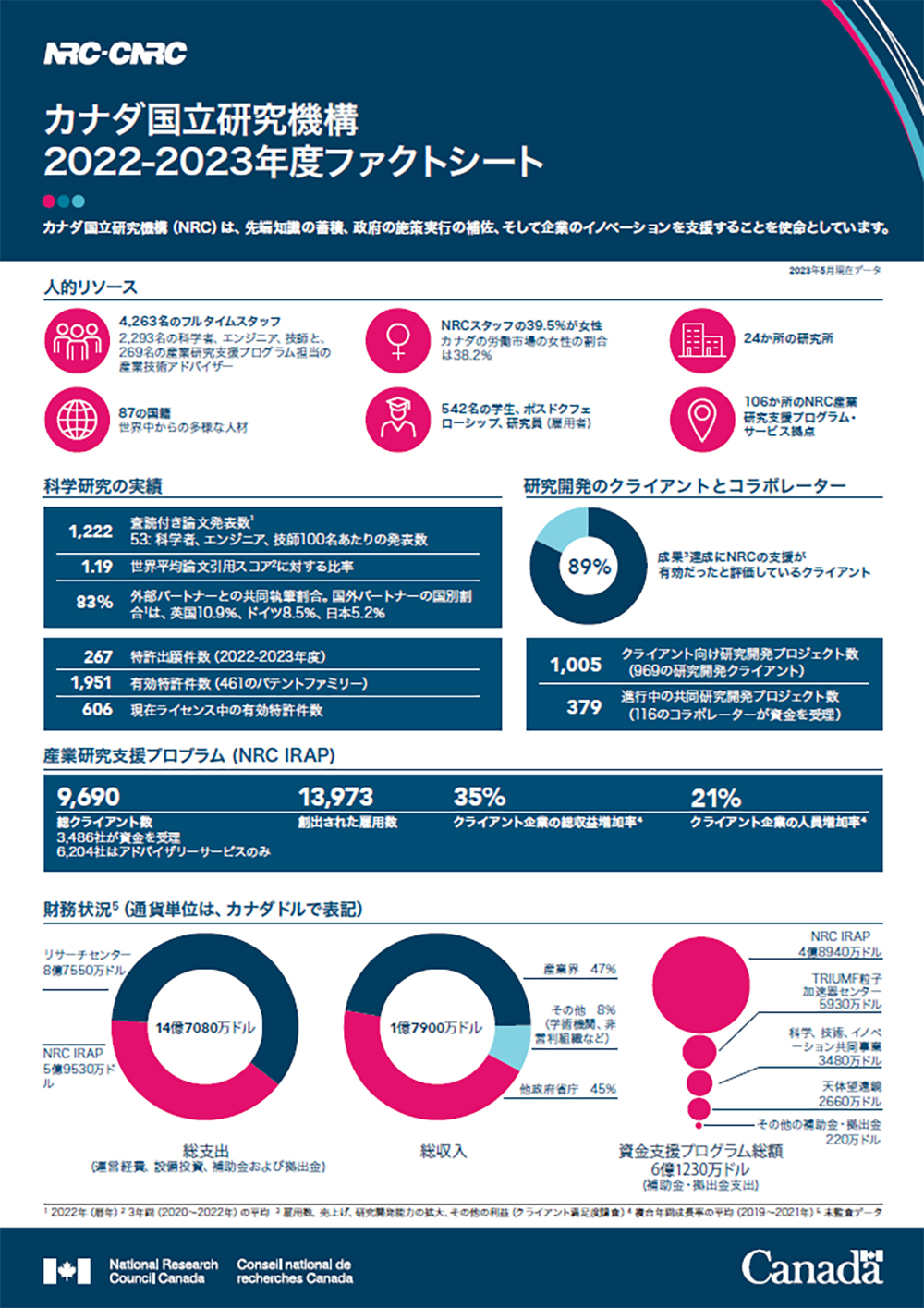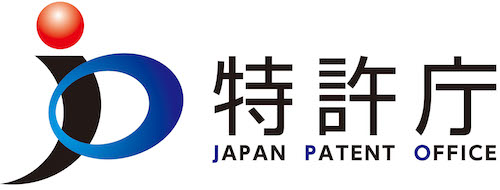IP BASE English Page
Interview with David Lisk, Vice President, NRC IRAP
Learning from NRC IRAP, an innovation assistance program designed to facilitate entrepreneurship and support global activities from the business-friendly country of Canada.
The National Research Council of Canada Industrial Research Assistance Program (NRC IRAP) provides advice, connections and funding to enhance innovation and bring new ideas to market for small and medium-sized enterprises in Canada. We spoke with David Lisk, Vice President of NRC IRAP, to explore NRC IRAP's wide-ranging activities, ranging from individualized support from professionals with expertise in various fields of technology to global expansion assistance in the form of fostering collaborative research and development and partnerships with international organizations, which include Japanese companies and research organizations.

David Lisk is the Vice-President of NRC IRAP.
Before this, he was a Director General and an Industrial Technology Advisor (ITA) for the Program. David is a seasoned industry veteran with over 35 years of experience in Information and Communications Technology (ICT), and has served in several senior executive positions in leading companies across the sector. David holds an MBA from the University of Ottawa and a Bachelor of Applied Science in Electrical Engineering from the University of Waterloo.
Supporting over 9,000 innovative Canadian small and medium-sized businesses annually

Boasting more than a century of history, the National Research Council (NRC) was founded in 1916 as a research organization to help the industrial sector in bringing new products to market. It has 24 research sites with 14 research centres across Canada, employing over 4,000 employees. It covers a wide range of fields from life sciences to engineering, building materials, vaccine development, etc. Recently, there has been a focus on digital technologies including artificial intelligence, automotive, and aerospace technology. It has large-scale research facilities and can conduct everything from compound research and development to semiconductor chip manufacturing and wind tunnel testing, to name a few. Some of its special facilities, of which only one or two exist in the world, are also used by Japanese companies.
NRC IRAP’s history dates back to 1947, when it was created to provide technical and scientific advice to help Canadian small and medium-sized businesses grow and strengthen the economy. From the 1960s, the program also started to provide funding assistance to companies to support research and development projects and encourage them to invest in innovation. Today, NRC IRAP has grown significantly and is delivered by a network of 269 experts known as Industrial Technology Advisors (ITAs), located in 110 offices across Canada.
“ITAs are required to have at least 20 years of practical experience and a technical background, as they provide support directly to company leaders and field staff. I, myself, have over 35 years of experience in the ICT industry, including semiconductor manufacturing, hardware, system development, and operational business. With this experience, I served as an ITA in the Ontario region from 2009 to 2012.” (Mr. David Lisk)

Another distinctive feature of the program is that it is by invitation, rather than through an open call for applications. ITAs visit eligible companies for interviews and hold discussions to determine whether they can participate in the program. Last fiscal year, NRC IRAP supported over 9,000 companies, of which 3,486 companies receive funding as part of the total budget of $489.4 million (CAD).
Significant sectors of investment include ICT at about 40%, followed by manufacturing at 20%, and other areas include aerospace, agriculture, life sciences, and cleantech. ICT is a very broad sector, and in the last few years, agricultural companies have also been investing in technology. In Canada, the AI industry is strong due to active research in artificial intelligence, and with the utilization of deep learning, these technologies are spreading across all industries.
Opening an Office in Japan as an Important Partner Country to Promote Mutual Cooperation in Overseas Expansion
David Lisk explains the background of NRC IRAP's current activities as follows.
While it is very beneficial for companies and national organizations to collaborate on research and development projects, it does not always lead to great success. There is also a need to respond to changing markets. Likewise, NRC IRAP is also adapting its support to the times. For example, with the launch of an international program in 2012 that helps companies understand their markets and support them in becoming more globally active. For example, we are part of the Eureka Network, an international network of primarily European funding agencies that are building international collaboration among companies in member countries and beyond. (David Lisk)
Japan was identified as a key partner country in 2018, and an NRC Japan office was established in 2019. Through its Japan office, the NRC is working with government agencies such as the New Energy and Industrial Technology Development Organization (NEDO), the Japan Science and Technology Agency (JST), and the Japan External Trade Organization (JETRO) to create opportunities for Japanese and Canadian companies to co-invest. As a result, NRC IRAP has over 40 projects funding Canadian SMEs for co-innovation with Japanese corporations. Additionally, NRC research centres also cooperate with Japanese research institutes and universities, including the National Institute of Advanced Industrial Science and Technology (AIST), RIKEN, and Advanced Telecommunications Research Institute International (ATR), and have more than 10 projects currently underway.

“We see tremendous opportunities for co-innovation between Canadian and Japanese companies,” indicates David Lisk. “The Japanese startup industry is currently undergoing a bit of a renaissance and is being rebuilt, and we have to remember that Japan’s ventures of half a century ago turned into many large Japanese multinationals of today. Startup companies in both our countries find it challenging to establish international connections and sales on their own. At the same time, large multinationals sometimes find it challenging to come up with innovations, and are interested in partnering with innovative startups that have useful proprietary technologies that can be integrated into their value chains. One of our key areas of focus is to connect large Japanese corporations that have a problem, with Canadian startups that can help address this problem. And NRC researchers can also sometimes support both companies in the process. To achieve this, it is necessary to maintain a good reputation as a partner for many years. NRC IRAP has been successful in providing such support.”
"To establish collaboration in Europe, we leverage the aforementioned Eureka Network, which helps to connect and fund international collaborations between companies. For Japan, we hope to establish a partnership with the Japanese government, to enable collaboration between Japanese and Canadian companies on themes and issues through a combination of matchmaking activities and funding. As a result, we have a window not only to Europe, but also to Asia, which could meet the needs of the Canadian side to secure prospective sales outlets for growth in the Asian market, while Japanese companies could have a window into the North American market." (David Lisk)
David Lisk says, "In Canada, there's an expression 'one and done', meaning you do something only once and never again. But, in innovation, you can't just finish in one go; you have to keep moving forward. Entrepreneurs are not 'created' but 'born', and I believe it's important to cultivate an entrepreneurial spirit that takes risks and does something different from others." (David Lisk)
To help entrepreneurs, Canada has established safety nets to help de-risk innovation. Since the 1980s, people in Canada started to take on more of an entrepreneurial spirit and, during the 1990s, this spirit was further bolstered by government support for venture capital initiatives. The government not only provided direct support but also facilitated the introduction of venture capital expertise from the United States. Additionally, angel networks and wealthy individuals played significant roles by investing in projects, thereby providing the necessary financial support to help new companies get off the ground.
As a result, Canada has become one of the easiest countries to start a business, with systems in place that allow corporate establishment documents and the like to be prepared in a relatively short amount of time. Furthermore, companies can receive loans without owning tangible assets, as intellectual property within the company is recognized as collateral for loans. The federal government also provides funds to incubators and accelerators nationwide through regional development agencies and central institutions, and universities support the growth of startup companies on campus and assist them in spinning out. Overall, it is evident that across Canada, an ecosystem has been developed to evolve the approach to business, access to capital, and the availability of training and education, paving the way for entrepreneurship.
Providing One-Stop Support from Intellectual Property-Related Development to Fundraising
Various support mechanisms are also in place regarding intellectual property. In recent years, Canada has seen an increase in cyberattacks against companies developing advanced technologies, many of whom could be working with NRC IRAP. By mandate, government funding for companies is proactively disclosed to the public on the Government’s website. While this is an important measure for transparency, it has also made it easier for adversaries to identify companies and put them at increased risk of cyber threats. As a result, NRC IRAP started to provide mandatory Cybersecurity training to all its funding recipients. Furthermore, in 2021, the Canadian Government asked NRC IRAP to offer a program that supports companies’ understanding and development of intellectual property strategies that can safeguard and leverage the companies’ innovations to help them achieve their business goals.
“We spent about three years reviewing the program, first advancing collaboration so that intellectual property rights experts across Canada could serve as consultation points, and then supporting the development of intellectual property strategies. Furthermore, in the stage of implementing the strategy, we have supported up to the point of understanding what can be done with products or services through discussions, grasping problems, and finding customers. However, customizing methods to suit each company requires a significant amount of funding, so the Business Development Bank of Canada has made it possible to provide loans secured by intellectual property." (David Lisk)
In this way, Canada has built an intellectual property ecosystem, with opportunities for intellectual property education and support from experts and centres available to anyone, whether they are entrepreneurs or not.
The Government of Canada has also launched an online intellectual property marketplace, where one can post their own intellectual property or purchase licenses. In Canada, there are about 50,000 startups that embark on technological innovations, and the Government of Canada has built a database in which 20,000 of these are registered. As another experimental initiative, a non-profit organization called "The Innovation Asset Collective (IAC)" is constructing a collection of patents it owns. While it is almost exclusively limited to the cleantech sector, it allows for the licensing of intellectual property at a very low cost.
The NRC has its own intellectual property experts who support the many patents NRC generates each year. To support Canadian businesses, NRC IRAP delivers a program (IP Assist) that connects companies to an intellectual property expert that can support the company with intellectual property advice, strategy development and action. Thus, through its various programs, the Canadian government is providing more intellectual property advice, collaboration, and reliable services to a wider audience.
Mr. David Lisk explains that the reason Canada as a whole is so committed to supporting startups is "because there's a very strong belief that Canada's long-term prosperity is tied to the formation of new companies that do not yet exist." Becoming competitive based on innovation is considered essential for the prosperity of its citizens and a very important skill set, indicating an ongoing commitment to this effort.



